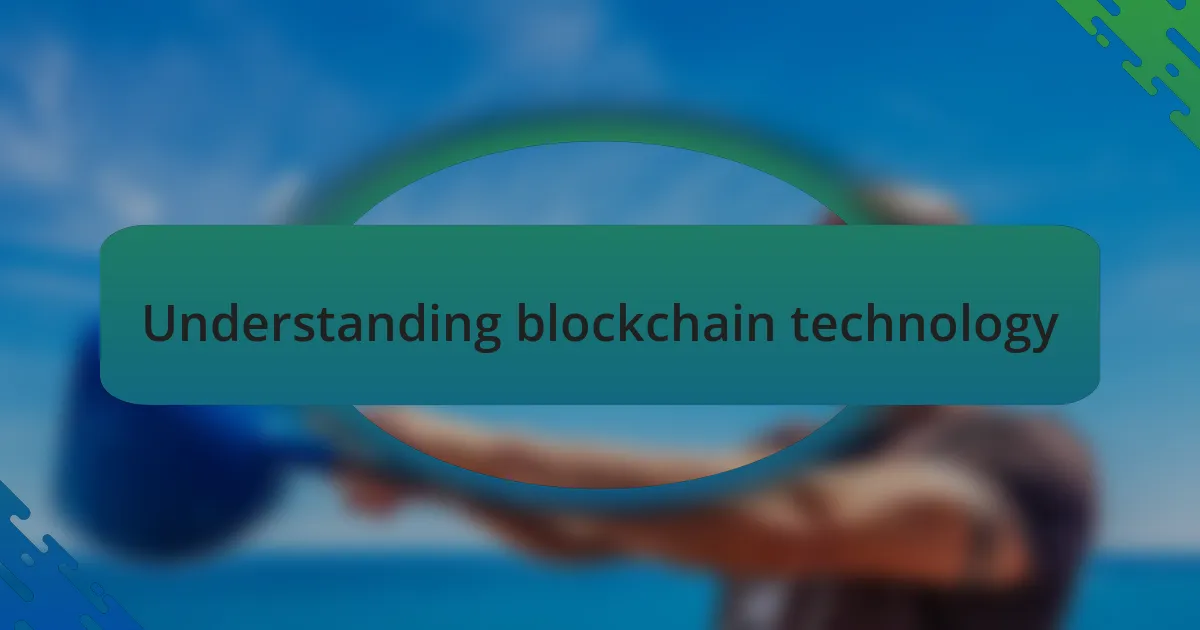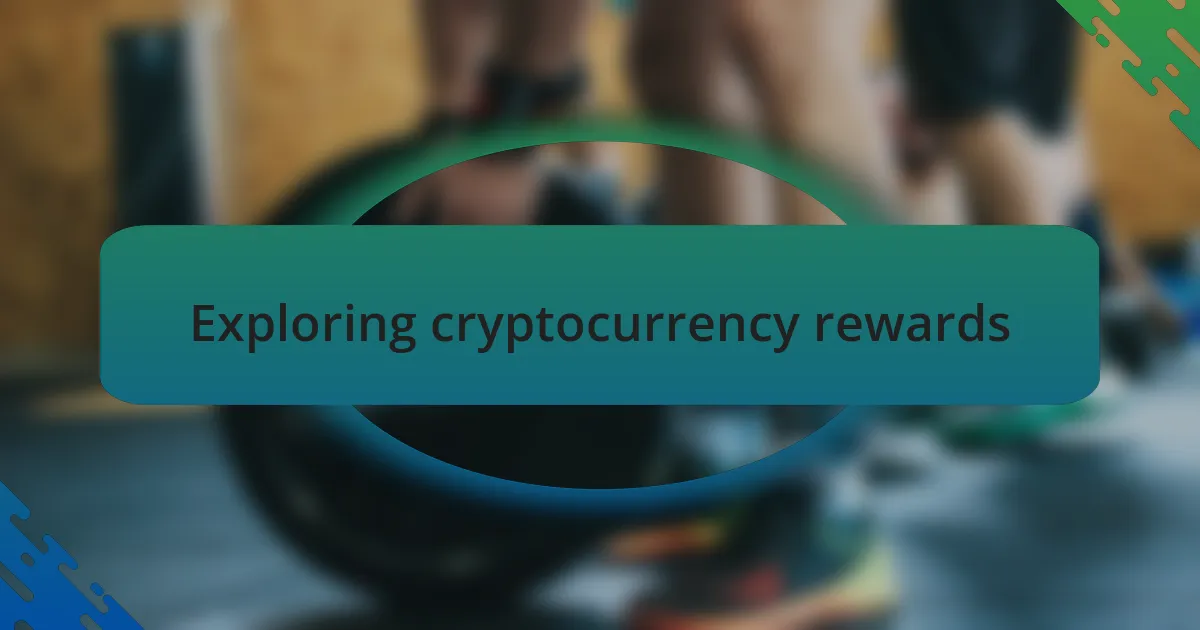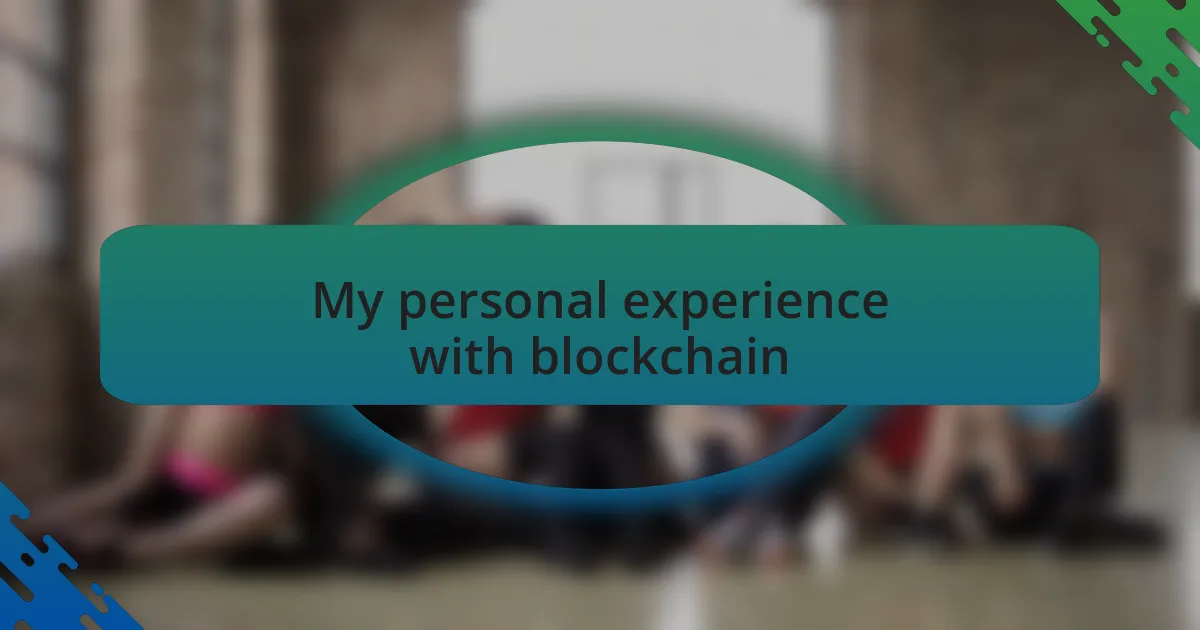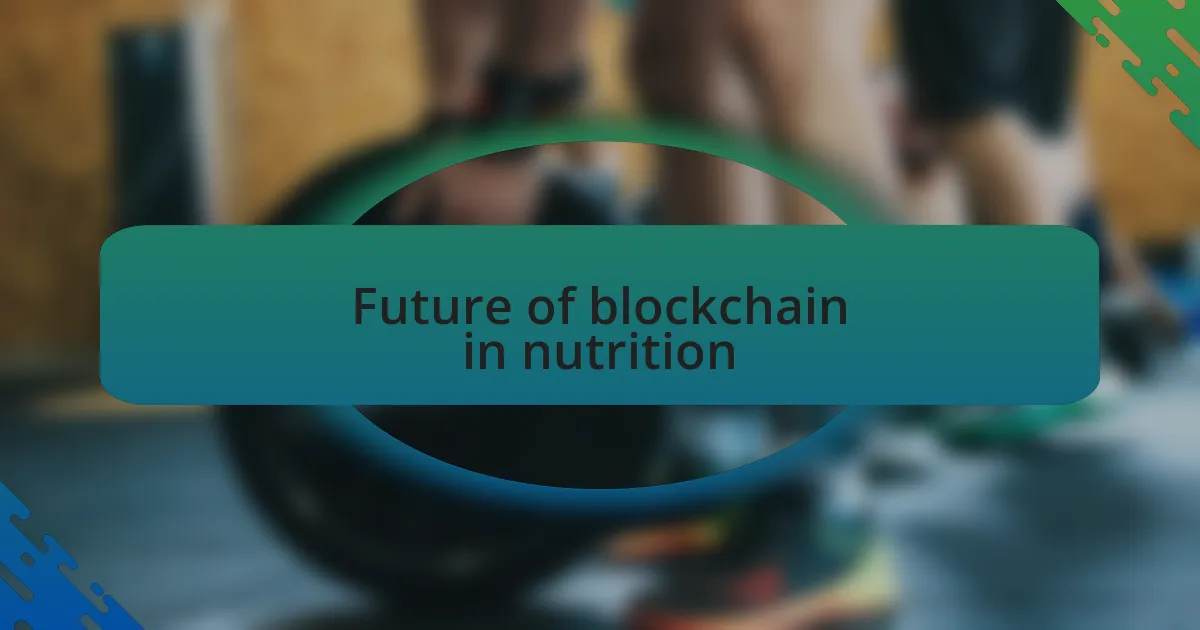Key takeaways:
- Blockchain technology provides an immutable and transparent record, enhancing trust in food tracking and nutritional data.
- Personalized nutrition plans and rewards through blockchain can motivate healthier eating habits and foster accountability.
- The potential integration of blockchain with wearable tech could revolutionize nutrition tracking by offering real-time, tailored dietary recommendations.
- Community sharing of verified nutrition data could create a supportive environment for healthier choices and engagement in fitness.

Understanding blockchain technology
Blockchain technology is a decentralized digital ledger that records transactions across many computers, ensuring that the record cannot be altered retroactively. I remember the first time I encountered blockchain; it felt like stepping into a futuristic world where transparency and security reign. Isn’t it fascinating how this technology can create trust in a system without needing a central authority?
The beauty of blockchain lies in its ability to provide an immutable record of data, which is particularly intriguing for me in areas like nutrition tracking. Imagine being able to trace the nutritional value of a food item from farm to table, with every step documented and verified on the blockchain. This level of transparency not only builds consumer trust but also empowers us to make informed dietary choices.
As I delve deeper into how blockchain functions, I’m often struck by the sheer complexity that lies behind its seemingly simple concept of open-source code and consensus among users. It raises questions, like how could this technology transform industries beyond finance? For me, the potential applications in nutrition and fitness tracking are truly exciting, hinting at a future where we won’t just track our macros but understand the entire lifecycle of our food.
![]()
Importance of nutrition tracking
Tracking nutrition is crucial for anyone looking to maintain a balanced diet and achieve their fitness goals. I vividly remember the time I committed to tracking my meals; the insights I gained about my eating habits reshaped how I approached food. Have you ever logged your meals and realized just how often you overlooked certain snacks or portion sizes? It was eye-opening for me.
When we actively monitor our nutrition, we gain a clearer perspective on our dietary choices and their effects on our wellbeing. For example, I found that simply being aware of my macronutrient intake helped me make better food selections and control cravings. It’s almost like having a personal coach guiding me, reminding me to prioritize whole foods over processed ones.
Moreover, effective nutrition tracking fosters accountability. Whether I’m using an app or a simple journal, seeing my progress motivates me to stay on track. Have you experienced that sense of accomplishment when you hit your dietary targets? It’s this feeling that drives me to explore new recipes and healthier alternatives, making my journey towards better health enjoyable and rewarding.

Benefits of blockchain in fitness
While delving into the benefits of blockchain in fitness, one striking advantage is the enhanced security and transparency it offers. I remember the first time I encountered blockchain technology; it opened my eyes to how data integrity is preserved. Can you imagine knowing that your personal fitness and nutrition data are safe from tampering? That peace of mind can be a game changer for anyone serious about their health journey.
Another significant benefit is the potential for personalized nutrition plans through smart contracts. This means that tailored meal recommendations could be automatically adjusted based on your progress, making the whole experience feel much more interactive. I often think how cool it would have been to have a system that learned from my eating habits and helped me evolve my diet dynamically, almost like having a nutrition coach that adapts in real-time to my needs.
Furthermore, blockchain can facilitate an ecosystem where consumers can connect directly with nutrition brands. I find it exciting to think about how this could foster trust between companies and consumers, ensuring people receive high-quality products. Have you ever felt skeptical about the food you’re buying and what’s really in it? With blockchain, transparency could inspire confidence, making consumers feel empowered in their choices.

Exploring cryptocurrency rewards
Exploring cryptocurrency rewards opens up a world of possibilities in the fitness landscape. When I first learned about how various fitness apps integrate rewards through cryptocurrency, I realized this was more than just a trend; it was an innovative way to incentivize healthy behavior. Have you ever been motivated to stick to a workout routine after a little extra cash? These rewards could serve as personal cheerleaders on our journey to better health.
In my experience, earning cryptocurrency for completing fitness challenges feels like gamification at its finest. I remember participating in a local fitness challenge that offered tokens for distance run or weights lifted. The thrill of watching my cryptocurrency wallet grow as I hit my goals added an element of fun I never expected. Have you thought about how turning effort into tangible rewards could transform your perspective on fitness?
Moreover, the potential for these rewards to be exchanged for nutrition products is particularly intriguing. Just imagine saving up tokens and then purchasing high-quality organic foods or supplements. This not only fosters a thriving community but also aligns economic benefits with healthier choices. I often find myself wondering—could this shift our mindset toward nutrition when our fitness efforts are literally rewarded?
![]()
How blockchain enhances nutrition tracking
Blockchain technology shines in the realm of nutrition tracking by ensuring data security and transparency. I recall trying to track my meals in various apps, but I often doubted the accuracy of the nutritional information. With blockchain, every entry can be independently verified, giving users confidence that they are truly aware of what they consume.
Another aspect that excites me is the potential for personalized nutrition recommendations. Imagine a future where your food choices are linked directly to your blockchain record of health metrics. This concept reminds me of when I did a deep dive into my dietary habits before my last fitness competition. The ability to tailor my nutrition based on reliable data not only maximized my performance but also fostered a strong sense of accountability.
Moreover, the integration of smart contracts in blockchain can facilitate automatic rewards for healthier eating choices. I’ve often thought about my moments of temptation in a grocery store, staring at unhealthy snacks. If only there were a system that automatically rewarded me for choosing nutritious products! This gamified element would not only promote better eating habits but could also revolutionize our approach to food sourcing and consumption.

My personal experience with blockchain
I first encountered blockchain technology while exploring different apps for tracking my fitness journey. It was a game-changer for me when I realized how transparent and secure blockchain could make food data. I still remember feeling a wave of relief when I finally trusted the information I was getting; it felt empowering to have such accuracy at my fingertips.
In one notable instance, I decided to participate in a study that utilized blockchain for nutrition tracking. The insights I gained from my data were astounding! It was like peering into a crystal ball that highlighted how my food intake directly impacted my energy levels and workout results. I still think about how insightful it was to finally connect those dots based on reliable data; it has changed the way I view my relationship with food.
Then there’s the idea of gamifying healthy eating with blockchain-based rewards. I vividly recall standing in the cereal aisle, tempted by sugary options, when I thought, “What if choosing whole grains could earn me rewards I could use for better products?” The thought of being incentivized to make healthier choices not only excites me but also sparks a vision for a healthier society. Wouldn’t that be an incredible shift in how we engage with our nutrition?

Future of blockchain in nutrition
The future of blockchain in nutrition is thrilling and full of potential. I envision a day when my meals come with a digital passport, detailing their journey from farm to table. Imagine how much peace of mind it would bring to know exactly where my food originated and how it was handled, especially with rising concerns about food safety.
As I ponder this, I can’t help but think about the community aspect as well. There’s something profound about sharing verifiable nutrition data among friends or within groups. Picture this: a local running club that uses blockchain to track their nutritional intakes collectively. They could share their dietary habits and experiences, creating a supportive environment where members encourage one another to make healthier choices. Wouldn’t that foster a deeper connection to both food and fitness?
On a more personal note, I’ve often dreamt about the possibility of integrating wearable tech with blockchain to fine-tune my nutrition intake. What if my smartwatch could analyze my physical activity in real-time and recommend meals based on my specific needs? Such advancements could transform nutrition tracking into a personalized journey. The thought of having tailored recommendations feels exhilarating, doesn’t it? With the rapid evolution of technology, the intersection of blockchain and nutrition seems not just likely but inevitable.